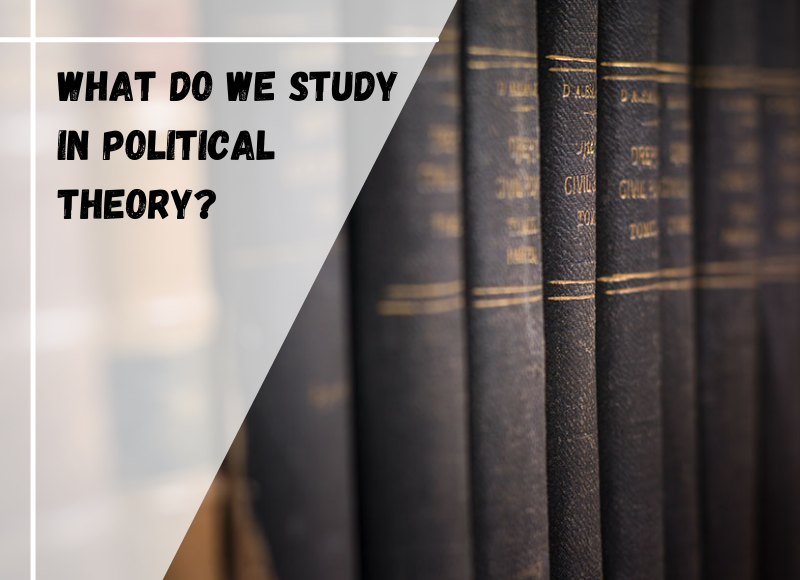Do you have a strong interest in politics? If so, political theory is the subject for you. Political theory is all about comprehending the ideas that have mould our politics, such as liberty, sovereignty, equity, individuality, and democracy. It is a part of Political Science that studies what a better political future would look like and how we can construct it.
In this blog, we will learn about political theory and what it entails.
Table of Contents
What is a political theory?
The study of political events and concepts, including subjects that impact them, is defined as a political theory. It covers law, justice, human rights, and political studies.
Philosophical, historical, contemporary affairs, and ethical issues are taken into account while studying political theory.
Knowledge of the interplay between these issues contributes to a comprehensive and complex understanding of political circumstances and the ideas that underpin them. Political theory entails raising questions about the relationships between various aspects of governance and the relationships between individuals and bureaucracy.
Why should we study political theory?
When you study political science, the first subject you must learn and comprehend is political theory.
And there are many difficulties to be overcome to comprehend political theory.
Political theory influences our thinking on culture and where we fit in. That is why we should study political theory as political science students, and it is beneficial. Other benefits are:
- To clarify what is happening around us.
- To be aware of our rights and responsibilities.
- And decide what should or should not be.
- To resolve legal issues.
- To comprehend global democratic growth and political crisis.
Functions of Political Theory
Political philosophy serves many vital functions in our society and around the world.
Understanding what is going on in society and around the world
The political theory will help us understand what is going on around us and throughout the world.
Political philosophy explains how to gather evidence from political activities and how to research it methodically.
Political theory plays an explanatory role
It’s now time to figure out why these incidents are occurring.
There are undoubtedly some reasons why women’s groups demonstrate against the regime.
The political theory provides theoretical/conceptual foundations for explaining why such movements occur.
When studying women’s protests, we often use philosophical concepts such as equity, liberation, freedom, and justice, among others.
Resolving ethical issues
Political philosophy has always taught us that the political developments that affect us are either positive or evil, right or wrong for all of us. The primary aim of political science is to discover the facts about our culture. Political philosophy also has a criterion for how positive or negative the reality is. It expresses what should or should not be.
It teaches us about good order in society and what makes it better. If something goes wrong in politics, the correct approach is generally given by political theory.
Justification for human behaviour
Political philosophy justifies human behaviour. This human behaviour may be clarified, as it gives the correct explanations for such acts.
For example, the 2003 invasion of Iraq was justified by the Just war doctrine. The Just war doctrine has provided the United States with justification for its actions.
Again, as we take steps and learn about our country, such as the Poverty Alleviation Program or inclusion in the Governance Decision Making Process, the concept of nation inspires us to do more.
The Aims and Scope of Political Theory
The empirical political theory aims to provide a clear picture of the activities of political reality.
It can be thought of as a machine and subsystems, as Easton and others did.
However, not all facets of politics are systemic and can be contradictory, as in contemporary West Asia or the rise of sub-nationalism in many parts of the Indian Union.
It may only consider processes, structures, or roles, or it may include classes or persons.
However, as a general political theory, it will have to include the whole of politics, both micro and macro.
Similarly, it must analyze political facts to direct academics and political leaders in achieving broader social aims, including personal ones.
As a well-recognized weapon, it can be relied on by all parties involved.
The development of a scientific, political theory, on the other hand, is a general and long-term goal of theory-makers.
However, it also has unique, short-term, and realistic goals.
There are facets of political philosophy that are applied, utilitarian, and moral.
Some of them are as follows:
- Establishment of peace and unity, such that there is no fear of extermination or extinction in the event of a nuclear or conventional conflict.
- Various races, nationalities, classes, and so on will coexist in grace and honour;
- Development of a political philosophy capable of guiding developed countries toward democracy and stability and rescuing them from chaos, poverty, and tyranny;
- Teach the advanced world’s self-transforming societies (popularly referred to as the prosperous ‘North’ in comparison to the impoverished ‘South’) to markets for greater affluence of all and to exercise self-control for greater individual freedom; and
- Finding ready-made solutions to challenges and crises that often emerge unexpectedly and inflict failure, even beyond salvation.
The scope or subject matter of contemporary political theory may be determined based on these goals. The key topics are political guy, political behaviour, political groups, governmental, administrative, or foreign politics; philosophy, ideology, parties, etc.
They vary from the contents of conventional political philosophy, which focuses on the study of values; the nature, creation, organization, and modes of state and government; institutions such as political parties and local self-government, the constitution, philosophies, etc.
Characteristics of political theories
Political theory is a human intellectual and moral creation.
Generally, it is a single individual’s speculation that seeks to provide us with a theoretical interpretation of political fact, i.e. the phenomena of the state.
Every theory, by definition, is an explanation based on specific hypotheses that may or may not be valid (and are always open to criticism).
So what we find in political theory is a series of attempts by thinkers dating back to Plato to unravel the mysteries of man’s political life.
They have provided a plethora of explanations that may or may not persuade us but on which we cannot pass final judgment.
Political theory is primarily an attempt to seek the truth as the thinker sees it and is typically expressed in the form of a treatise such as Plato’s Republic, Aristotle’s Politics, Hobbes’s Leviathan, or Rawls’ A Theory of Justice.
Third, political theory is discipline-specific.
It means that, while the theorist explains the phenomenon remains the same, namely the state, the writer could be a philosopher, historian, economist, theologian, or sociologist.
As a result, we are confronted with a plethora of political theories, each distinguished by the discipline on which it is based.
Fourth, political theory comprehends and explains social and political reality and actively participates in hastening the historical process.
Political theory’s task is to understand and explain and devise ways and means to change society.
According to Laski, the task is a description of what is and a prescription of what should be.
As a result, political theory suggests agencies of action and means of reform, revolution, or conservation.
It includes programs that represent both ends and means.
Political theory serves a dual purpose: it helps to understand society while also suggesting ways to improve it.
Finally, political theory encompasses political ideology.
In layman’s terms, ideology is “a system of beliefs, values, and ideals by which people allow themselves to be governed.”
In the modern world, we find a diversity of ideologies such as liberalism, Marxism, socialism, etc.
From Plato to the present, all political theories reflect the writer’s distinct ideology.
Political theory, also known as a political ideology, is a set of political values, institutions, and practices that society has adopted as its ideal. For instance, all political theories adopted by Western Europe and America have been dominated by liberalism. In contrast, a specific brand of Marxism has influenced theories accepted by China and the former USSR.
In this sense, each brand of theory or ideology claims universality for itself and forces others to accept it, resulting in “ideological conflicts.”
What do we study in Political Theory?
Political Theory consists of:
- Conceptual structure ideas such as rights, democracy, equality, liberty, justice, power, authority, state, etc.
- Theories and Philosophies such as Marxism, Liberalism, Socialism, Libertarianism, Fascism, Feminism, Gandhism, and so on.
- Philosophers and Thoughts work of famous thinkers (Plato, Aristotle, Marx, etc.) who developed numerous theories and concepts
If we learn about what we study in political theory, it would be movements, development, and change. But if we comprehend thoroughly, we see specific values and principles that have inspired people and guided policies.
Ideals such as independence, liberty, and equity come to mind.
Different countries can attempt to preserve those values by enshrining them in their constitutions, as is the case with the American and Indian constitutions.
These texts did not appear overnight; they are based on concepts and principles discussed almost since the time of Kautilya, Aristotle, Jean Jacques Rousseau, Karl Marx, Gadhi, and Ambedkar.
Plato and Aristotle debated whether monarchy or democracy was preferable to their students as early as the fifth century BC.
Rousseau was the first to advocate for democracy as a fundamental human right in modern times.
Karl Marx concluded that liberty was almost as essential as democracy.
In his book Hindu Swaraj, Gandhi explored the significance of the word “genuine.” Ambedkar argued vehemently that scheduled castes should be considered a minority and, as such, should be afforded special rights. These principles are enshrined in the Indian Constitution.
Political philosophy is concerned with the ideas and values that have influenced the nation. It defines terms like rights, liberty, justice, secularism, socialism, and so on.
It investigates the importance of principles such as the rule of law, separation of powers, judicial appeals, and so on.
It is accomplished by analyzing the claims advanced by various scholars in support of these ideas.
About the fact that Rousseau, Marx, and Gandhi did not become leaders, their thoughts inspired generations of politicians around the world.
Making predictions when looking at developments from a past viewpoint is a risky proposition. That is where theory enters the picture. The theory is how we imagine the future. Valuable empirical data is historical, and applying a specific concept in the present or future may no longer be applicable. Politics is constantly changing.
Ironically, the only certainty is political transition!
Both theories, in principle, are conceptualized in the future, with the current and history serving as guideposts.
However, we cannot depend on the past or current to predict possible results.
The political theory curriculum addresses this thesis in two ways: by exposing students to the ancient history of political theory and educating students in the debates of modern political theory.
Many of the courses incorporate both viewpoints, allowing students to hear about critical topics like justice and democracy as they have been interpreted traditionally and as we see them today.
In conclusion
From the preceding discussion, it is clear how crucial political theory is in our lives, societies, and the world as a whole.
It helps us think, it helps us find solutions to problems in our political world, and it also gives us reasons for our every political action.
Again, no political theory implies political problems without solutions. Every subject develops as a result of its theoretical dimension. The theory establishes a subject as a distinct academic discipline.









 How to Write a Resume Summary
How to Write a Resume Summary